Launching a construction enterprise requires a solid blueprint, much like the structures you aim to build. Our tailored business templates are the perfect foundation to ensure your business starts on the right foot. Designed with the unique intricacies of the construction industry in mind, these templates streamline processes, minimize oversights, and set the stage for operational excellence. Discover how our resources can be the cornerstone of your successful construction business incorporation.
5+ Construction Business Incorporation Samples
1. Construction Business Incorporation Template Bundle
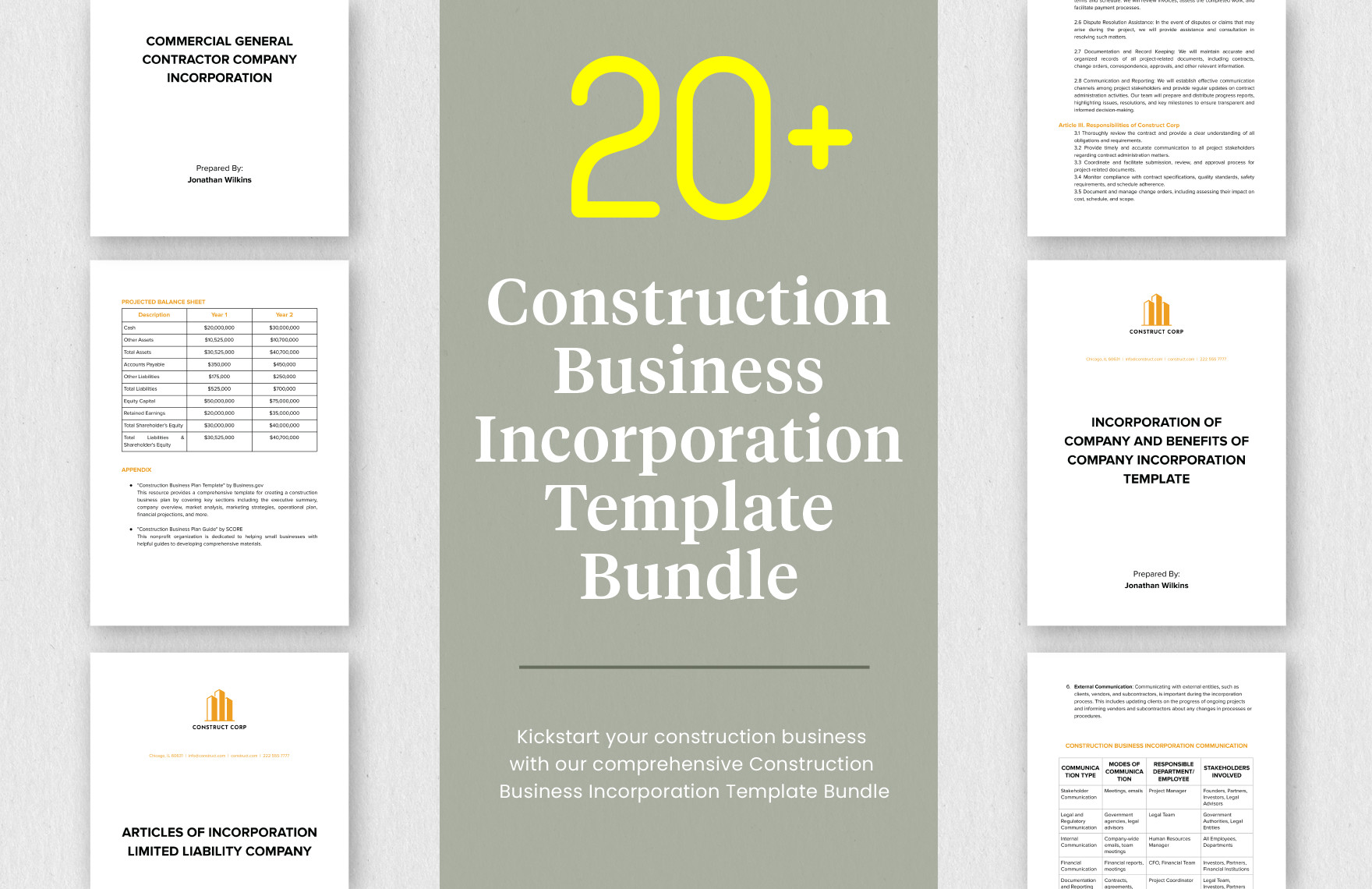
2. Construction Business Incorporation Insurance Document
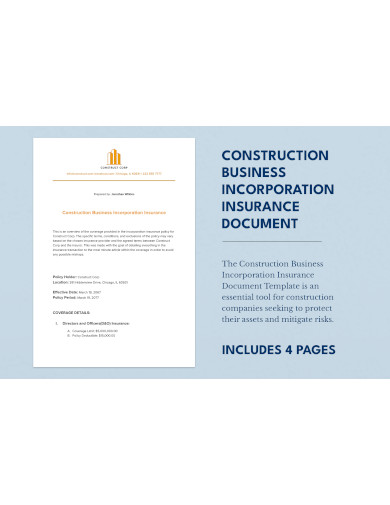
3. Construction Business Incorporation Communication Template
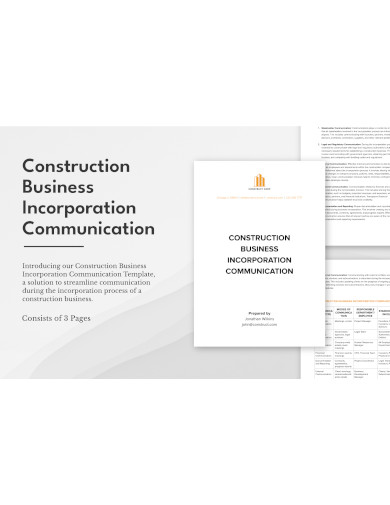
What is Construction Business Incorporation?
Understanding the Basics
Construction business incorporation refers to the legal process of forming a distinct entity for the purpose of conducting construction-related activities. At its core, this means that the business, whether it’s a sole proprietorship, partnership, or corporation, is recognized as separate from its owners. This separation provides numerous financial, legal, and operational benefits.
Why Incorporate?
Incorporation offers a shield of personal liability protection for the business owners. In the event of legal disputes or financial distress, the personal assets of the owners are generally protected from any claims. Moreover, an incorporated business often finds it easier to secure loans, attract investors, and engage in large contractual deals.
Types of Construction Business Entities
There are several types of business entities that construction firms can choose to incorporate as:
- Limited Liability Company (LLC): Provides the flexibility of a partnership while offering the liability protection of a corporation.
- S Corporation: Allows for pass-through taxation, meaning the company itself is not taxed, but the shareholders are.
- C Corporation: A more complex structure which is taxed separately from its owners.
- Sole Proprietorship: While not a corporation, it’s the simplest business form under which one can operate a business.
Considerations for Incorporation
Before choosing to incorporate, construction businesses should consider the scale of their operations, potential tax implications, desired level of liability protection, and future plans for expansion or potential sale.
How to Start a Construction Company
Develop a Business Plan
Every successful construction company begins with a solid business plan. This document will outline your company’s mission, target market, competitive analysis, financial projections, and operational strategy. It serves as a roadmap for your business and can be crucial when seeking financing.
- Legal Requirements
- Before breaking ground or signing contracts, it’s essential to:
- Register your business name.
- Choose a suitable business entity type (as discussed above).
- Obtain the necessary permits and licenses specific to your state or region.
Ensure compliance with local, state, and federal construction standards and regulations.
Secure Financing
Starting a construction company requires substantial capital for equipment, labor, and materials. Explore various financing options, including bank loans, investors, or personal savings. Maintaining a detailed financial forecast will also help manage cash flows efficiently.
Build a Team
The construction industry relies heavily on skilled labor. Hire qualified professionals, from on-ground workers to project managers. Investing in continuous training ensures your team stays updated with the latest industry standards.
Invest in Equipment
Depending on the type of construction work you intend to do, you’ll need to invest in equipment. This can range from heavy machinery to safety gear. It’s crucial to ensure all equipment meets safety regulations.
Marketing and Client Acquisition
In the digital age, an online presence is vital. Invest in a professional website, showcase past projects, client testimonials, and service offerings. Traditional marketing, such as networking within the community and building relationships with suppliers and other industry professionals, remains equally important.
Continuous Learning and Adaptation
The construction industry is continually evolving with new technologies, materials, and methods. Stay updated with industry trends, attend workshops, and ensure your business remains adaptable to the changing landscape.
By following these steps, aspiring entrepreneurs can lay a strong foundation for their construction company, ensuring success and sustainability in the competitive market.
4. Construction Business Incorporation Payment Form Template
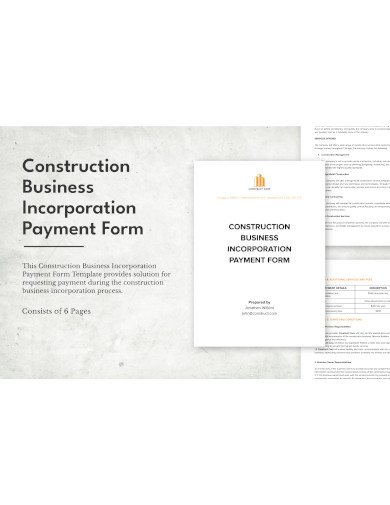
5. Free Construction Business Incorporation Change Form
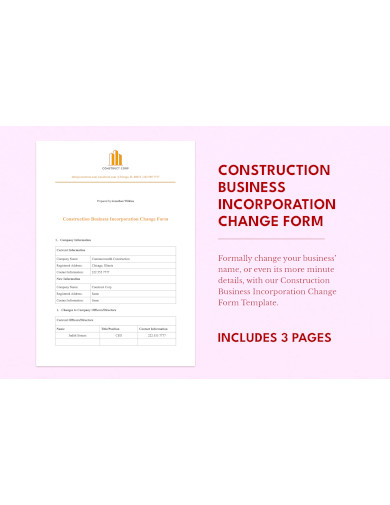
6. Construction General Contractors Business Incorporation
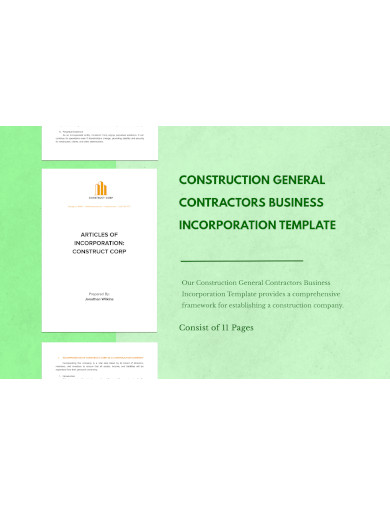
How Do I Organize My Construction Business?
Understanding Your Niche
Before diving into the organization, it’s essential to understand the specific niche your construction business caters to. Whether you focus on residential projects, commercial structures, renovations, or specialty construction, your niche will determine much of your organizational strategy.
Streamline Administrative Processes
- Efficient administrative processes are the backbone of any organized business. Consider:
- Digital Solutions: Adopt construction management software to handle scheduling, budgeting, and communication.
- Document Management: Use digital filing systems to ensure all contracts, permits, and other essential papers are easily accessible and secure.
Centralize Communication
Construction projects involve many stakeholders, from clients to suppliers. Implement:
- Unified Communication Platforms: Tools like Slack or Trello can help centralize communication, ensuring everyone is on the same page.
- Regular Meetings: Schedule weekly or bi-weekly meetings to review project progress, address concerns, and align team objectives.
Inventory and Equipment Management
A construction business relies heavily on tools, equipment, and materials. Organize by:
- Regular Inventory Checks: Conduct routine checks to track materials and prevent theft or wastage.
- Maintenance Schedules: Regular maintenance ensures your equipment remains in optimal condition and reduces unexpected downtimes.
Financial Organization
Maintaining financial order is vital. Implement:
- Budget Tracking Systems: Monitor your spending against the project’s budget to avoid overspending.
- Dedicated Accountant or Software: Use accounting software or hire a professional to keep track of finances, ensuring compliance and profitability.
Pros and Cons of Incorporating Construction Business
Pros:
Personal Liability Protection
Incorporating separates the business as a distinct entity. This means owners aren’t personally responsible for business debts, liabilities, or legal disputes.
Tax Flexibility
Certain incorporation structures, like S Corporations, allow businesses to avoid double taxation. Businesses can also benefit from additional tax deductions and credits.
Credibility and Branding
An incorporated business often appears more professional to potential clients, suppliers, and investors. It might also be easier to obtain financing.
Potential for Growth
Corporations can issue shares of stock, providing a path for business expansion and attracting investors.
Cons:
Cost and Complexity
Incorporation involves legal fees, state incorporation fees, and potential ongoing fees. It also introduces added layers of paperwork and formalities.
Regulatory and Tax Compliance
Incorporated businesses are subject to specific regulations and reporting requirements. Ensuring compliance can be time-consuming and might require hiring specialized professionals.
Potential for Double Taxation
Unlike S Corporations, traditional C Corporations face double taxation: once at the corporate level and once when distributing dividends to shareholders.
Less Personal Control
Depending on the business entity chosen and the number of shareholders, original business owners might find they have less direct control over business decisions.
Understanding the pros and cons of incorporation helps construction businesses make informed decisions about the best structure to suit their needs and growth aspirations.
Related Posts
Retirement Speech Samples & Templates
Weekly Schedule Samples & Templates
Contractual Agreement Samples & Templates
FREE 9+ Amazing Sample Church Bulletin Templates in PSD | PDF
Sample Business Card Templates
Sample Cashier Job Descriptions
Questionnaire Samples
FREE 10+ Sample HR Resource Templates in PDF
FREE 49+ Sample Job Descriptions in PDF | MS Word
FREE 23+ Sample Event Calendar Templates in PDF | MS Word | Google Docs | Apple Pages
Company Profile Samples
FREE 10+ Leadership Report Samples [ Development, Training, Camp ]
FREE 24+ Sample Payment Schedules in PDF | MS Word
FREE 10+ Return to Work Action Plan Samples in PDF | DOC
Autobiography Samples & Templates
